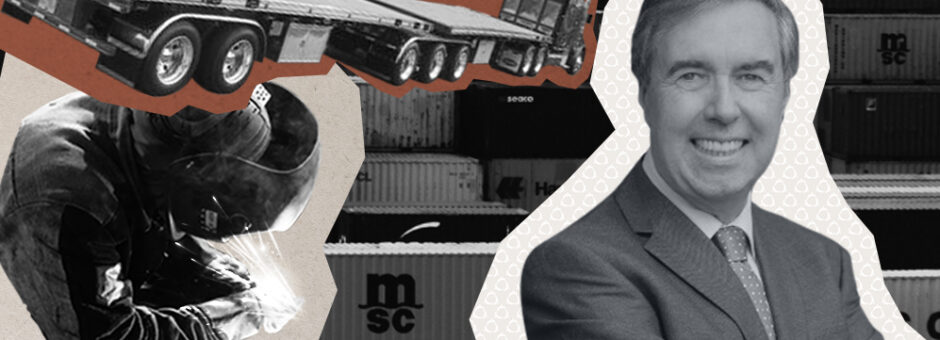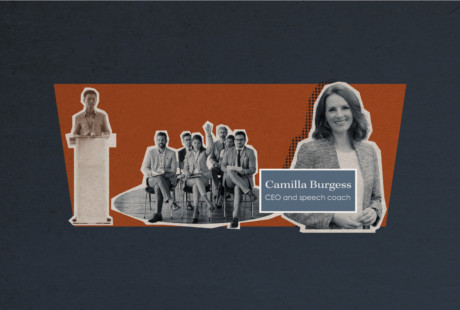Related:
Communication and the Art of Manufacturing Leadership
“It’s unprecedented, our order books are almost a full year out,” explains Andrew Taylor, President & CEO of Abbotsford-based custom trailer manufacturer Magnum Trailer. “We see it as an economic indicator because people are not going to invest in fleet expansion or capital improvement unless they have some degree of confidence in the short and mid term economic circumstances.”
A black swan pandemic event followed closely by an economic boom presents opportunities, challenges, and questions. Labour, working structure, and supply chain were all top of mind when Taylor recently spoke with Goldbeck Recruiting.
Strengthening Business During Pandemic
“If we don’t come out of the pandemic in better shape than going in then, as leaders, we haven’t done our job,” says Taylor. He admits that this represents a departure from his thinking early in the pandemic, which was “to sort of hunker down and manage not to fail.”
The CEO reports that his attitude changed after attending a virtual conference with Professor Ranjay Gulati of Harvard Business School. “His take was ‘don’t waste a great pandemic’. Statistically, whenever there’s been a large disruptive environment, whether it’s a recession, a pandemic, or something else, only 9% of businesses come out the other side having taken advantage of the time to become better positioned.”
Taylor believes that operational and strategic vulnerabilities are laid bare during tumultuous times, conditions that invite proactive action.
Skilled Trade Labour Shortage
One challenge that currently needs to be addressed is the supply of skilled trades in manufacturing, which Taylor describes as ‘dire.’
“As I sit here right now, we could hire 15 to 20 qualified fitter welders but they’re just not out there. Everyone is competing for essentially the same talent pool,” he explains, adding, “we don’t have a lot of career fair movement encouraging youth into apprenticeship.”
Taylor stresses the importance of both recruiting and retaining talent; he bolsters both efforts by highlighting development opportunities.
“We have some very long term employees who started out on our shop floor and are now either in a sales leadership role or an operations role,” he says. “These jobs can lead to great opportunities for those who are willing to hang in and develop.”
Supply Chain Challenges
Taylor sees supply chain threats as another challenge to business as usual. Ports are seeing surges of ships while containers are in short supply globally. The recent blockage of the Suez Canal only exacerbated the problem.
“As good as it is to have full order books, they come with supply chain constraints and can send commodity prices through the roof,” explains Taylor, who has seen freight charges rise rapidly. “To ship a 40 foot container from Asia to the Port of Vancouver is normally $1600-1800, but got as high as $5500 in March.”
Hybrid Working Arrangement
The relative success of 2020’s great experiment in remote work has caused business leaders everywhere to ponder the future role of the physical office and Taylor is no exception. Magnum has run a hybrid model for support roles, which he describes as a success.
“That’s a big conversation piece internally,” says Taylor. “Do we continue what we’re doing presently with those roles such as engineering, HR, finance, marketing and sales? Do they really need to be full time back in the office? We believe no, but we don’t believe these functions are ever going to be fully remote either. We believe in team interaction,” he says, adding “Zoom and various other technologies only get you so far.”
Automation and Relocation
Taylor says that his peers in the British Columbia business world are considering various options to address the labour and financial hurdles that have been brought upon as a partial result of the pandemic.
“Some businesses can pivot to becoming more and more capital intensive through automation rather than dealing with hiring,” he says. “Other businesses are saying that perhaps this is the trigger that causes them to finally take a good hard look at the business and it’s viability in British Columbia.”
Taylor reports that some businesses are finding Manitoba, with it’s cheaper labour and abundance of real estate, to be an attractive alternative. “There’s a lot of talk about potential exit from the province amongst my peers,” he explains. “I don’t want to create the impression that they’re definitely planning to move, but it’s food for thought.”
A New Roaring 20s?
“There’s a lot of talk of the roaring 20s and I anticipate that this is what we will see,” says Taylor. “On a personal note, I’m feeling handcuffed by the lack of ability to travel. When we regain some semblance of normalcy, I believe it’s going to translate into heyday spending at a consumer level.”
He’s not alone in his assessment. While optimism is widespread, even seasoned economists are unsure what to expect.
“How long is the peak that we’re experiencing? What does life look like after government stimuli are removed?” Taylor wonders. “Do we stabilize at pre-pandemic economic activity or is this the new norm? It is very much a time of pent up demand but how big is that pent up curve and what does life look like after it?”
Taylor tempers his optimism with a note of caution. “The big question that seems to be on the table is, do we see a recession after the roaring 20s, as we did in the early 1930s straight after the last roaring 20s?”
While Taylor, like his peers, lacks a crystal ball, for now he’s taking action to move into the future stronger than ever.
“My advice to fellow CEOs and leaders is to ask yourself, ‘what are you doing to make the organization better coming out of this?’




